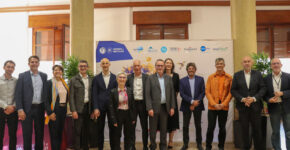Intergovernmental Science-Policy Platform on Biodiversity and Ecosystem Services (IPBES)
The University of Montpellier has won a call for tenders issued by the United Nations Environment Programme (UNEP) and is now home to the technical support unit coordinating an assessment supported by the Intergovernmental Science-Policy Platform on Biodiversity and Ecosystem Services (IPBES). Within the Direction des Programmes Structurants de l'Université de Montpellier (DPS), which coordinates the institution's flagship programs, the IPBES project is attached to the service d'appui à l'international et à l'attractivité des programmes structurants (SAIA).
Assessing transformative change
The assessment aims to identify and understand the factors in human society, at both individual and collective levels and from local to global scales, that can be mobilized to bring about transformative change to ensure the conservation, restoration and sustainable use of biodiversity, taking into account social and economic factors in the context of the Sustainable Development Goals.
OBJECTIVES
The overall objective of IPBES is to strengthen the science-policy interface for biodiversity and ecosystem services with a view to the conservation and sustainable use of biodiversity, long-term human well-being and sustainable development.
The assessment is entitled "Thematic assessment of root causes of biodiversity loss, drivers of transformative change and solutions to achieve the 2050 Biodiversity Vision". It is in line with Vision 2050 of the Convention on Biological Diversity and its Kunming-Montreal Global Framework for Biodiversity, adopted in December 2022 by its States Parties.
The Platform's Global Assessment of Biodiversity and Ecosystem Services (2019) concluded that there are possible pathways to realizing the Biodiversity Vision 2050 alongside key human development goals. However, these pathways require fundamental shifts in development paradigms and socio-ecological dynamics, leading to societal transformations, taking into account inequalities and governance, using land, water, energy and materials much more sustainably as well as rethinking and appropriately modifying consumption patterns, food systems and global value chains. The assessment will inform decision-makers about options for implementing transformative change to achieve the Biodiversity Vision 2050 and the Sustainable Development Goals.
The assessment should also inform sub-national, national, regional and global policies concerning the preservation and sustainable use of biodiversity and ecosystems, natural resources and nature's contributions to people.
Targets: governments; governing bodies of multilateral environmental agreements; decision-makers within global policy frameworks, sub-national governments and local authorities; scientists; education systems and the media; the private sector and civil society, including indigenous peoples and local communities, youth, women and non-governmental organizations.
The assessment will take into account - at different scales around the world - the psychological, behavioral, social, cultural, economic, political, governance, institutional, demographic, technical and technological dimensions, all of which have an impact on biodiversity.
What are transformative changes?
For the purposes of the assessment, and in line with previous IPBES work approved by the IPBES Plenary, transformative change is defined as an in-depth system-wide reorganization of all technological, economic and social factors, including paradigms, goals and values.
Assessment chapters
The assessment of transformative change is divided into five chapters written by five sub-groups of authors. Each chapter has its own specific objectives.
Chapter 1: Transformative change and a sustainable world
- Define transformative changes and explain why they are necessary.
- Exploration of all the players who influence and impact biodiversity degradation.
- Reflecting on how the spatio-temporal framework complicates or facilitates transformative change.
- Evaluation framework and roadmap.
Chapter 2: Visions of a sustainable world for nature and people
- Reflecting on the challenges that transformative change can present, drawing on science and the diversity of norms and values around the world.
- Presentation of different values and visions for a sustainable world, and the scenarios that illustrate them.
Chapter 3: How transformative changes take place
- Presentation of how transformative change takes place, with a focus on changes that can be intentionally fostered, accelerated and calibrated to achieve a sustainable world.
- Understanding these deliberate changes to highlight ways of generating and nurturing them.
Chapter 4: Overcoming the challenges of transformative change for a sustainable world
- Assessment of obstacles to transformative change.
- Development of strategies to overcome these obstacles in order to promote global, local and regional visions of a sustainable world for nature and people.
Chapter 5: Achieving a sustainable world for nature and people: transformative strategies, measures and individual roles
- Assessment of options concerning institutions, instruments, evaluation and ways to realize the visions of a sustainable world presented by the previous chapters.
- Development of desirable scenarios and the means to achieve them, including options and actions for the short term (up to 10 years), medium term (10-20 years) and long term (20-50 years).
Team composition
- 3 co-chairmen: Lucas Garibaldi (Argentina), Karen O'Brien (Norway), Arun Agrawal (United States)
- 15 main coordinating authors
- 61 main authors
- 10 publisher-editors
- 12 young researchers
- 102 authors in all
Management Committee: Markus Fischer, Madhav Karki, Özden Görücü, David Obura, Floyd Homer
Technical support unit: Laurence Perianin (manager), Camille Guibal (program manager), Anouk Renaud (program assistant)
Timeline
The evaluation will take place over three years, from 2022 to 2024, with an evaluation approval and team selection phase in 2021.
2021
- June: Approval of the assessment of transformative change by the 8th IPBES Plenary (decision IPBES-8/1).
- August 26: Expert nominations open to governments and stakeholders.
2022
- January: IPBES appoints co-chairs, lead coordinating authors, lead authors and review editors for the assessment.
- April: Creation of the technical support unit for evaluation at the University of Montpellier.
- May 9 to 13: First authors' meeting in Montpellier with the entire evaluation team: co-chairs, lead coordinating authors, lead authors, editor-reviewers, members of the technical support unit and the evaluation management committee.
2023
- February 3 to March 17: First external review (6 weeks) - draft chapters made available for public review on the IPBES website.
- May 22 to 26: Second authors' meeting with the full evaluation team, on the CATIE campus in Costa Rica.
- May 27 to 29: First meeting to draft the Summary for Policy Makers (SPM) with the evaluation management committee and lead coordinating authors.
- May 30: capacity-building webinar live from the CATIE campus, retransmitted to the UM for the scientific community.
- August 22 to September 2: 10th IPBES plenary meeting - Assessment progress report.
- September 27 to 29: Second meeting to draft summary for decision-makers.
- December 4, 2023 to February 2, 2024: Second external review (8 weeks) of draft chapters and draft summary for decision-makers made available on the IPBES website for public review.
2024
- February 19 to 23: Third authors' meeting.
- February 18, 25 and 26: Third meeting to draft summary for decision-makers.
- April 24 to 26: Fourth meeting to draft summary for decision-makers.
- July1 to August 11: Additional review of draft chapters and summary for decision-makers by governments.
- October 15 to November 26: Final external review (6 weeks) - final version of draft summary for decision-makers and chapters made available for review by governments.
- December 10 to 16: The 11th IPBES plenary considers the summary for decision-makers for negotiation/approval and presents the chapters for acceptance.
- Post-approval of the assessment: publishing and communication activities following adoption of the assessment.
Publication of the IPBES report
Planet in peril: IPBES report reveals options for achieving the transformative change urgently needed to halt biodiversity collapse.
The focus is on the underlying causes of the biodiversity crisis and the options for a just and sustainable world. Acting now could generate $10,000 billion in value.



